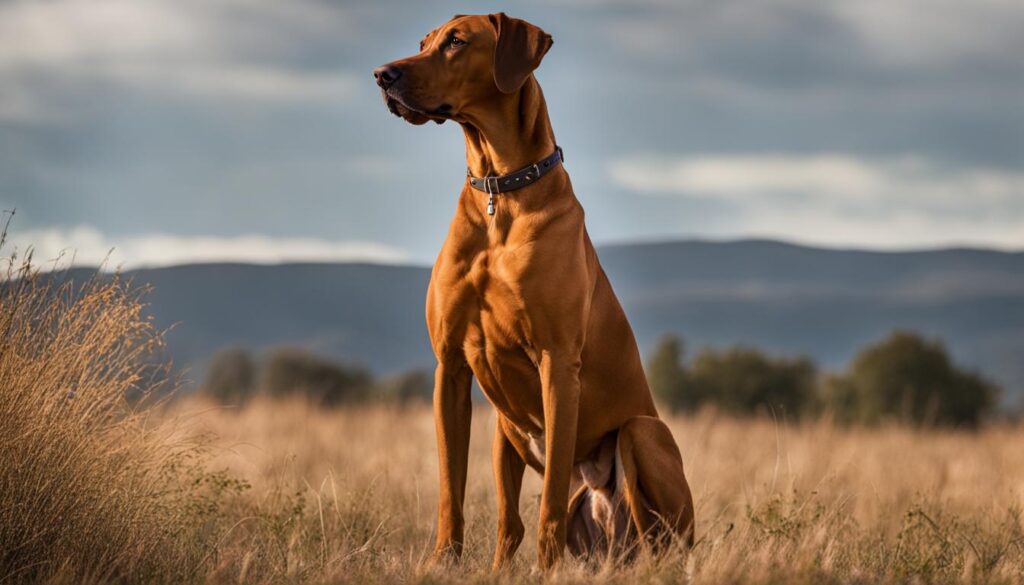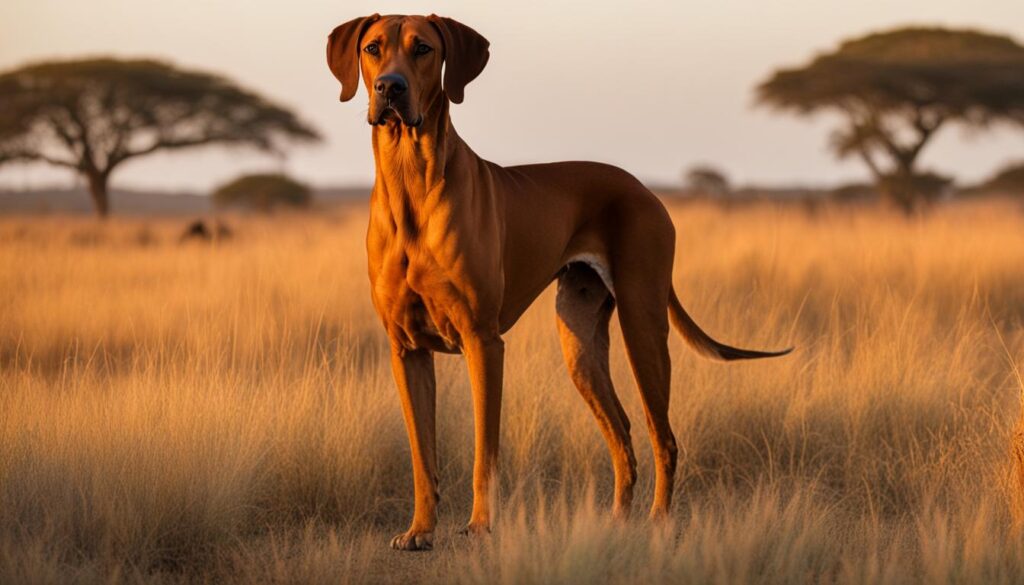Greetings, fellow dog enthusiasts! Today, I want to delve into the captivating world of Rhodesian Ridgebacks. These remarkable canines have piqued my curiosity with their distinctive ridge of hair along their backs. Join me on this journey as we uncover the secrets behind the fascinating Rhodesian Ridgeback breed.
Key Takeaways:
- Rhodesian Ridgebacks are known for their unique ridge of hair along their backs.
- Originally bred in southern Africa for hunting and guarding.
- Rhodesian Ridgebacks are strong, intelligent, and loyal animals.
- They have a dignified and noble appearance.
- Proper training and regular exercise are essential for their well-being.
The Characteristics of Rhodesian Ridgebacks
Rhodesian Ridgebacks are medium to large-sized dogs with a muscular build and a short, dense coat. They have a distinctive ridge of hair along their backs that grows in the opposite direction of their coat. This ridge is formed by a strip of hair with a whorl or crown that creates a symmetrical pattern. Their coat colors vary from light wheaten to red and may have white markings on the chest and toes. They have a dignified and noble appearance.
When it comes to their size, male Rhodesian Ridgebacks typically stand between 25-27 inches at the shoulder and weigh around 85-90 pounds, while females are slightly smaller, measuring 24-26 inches in height and weighing approximately 70-75 pounds. Their strong, athletic bodies are built for endurance and agility.
The Ridgeback Puppies
Rhodesian Ridgeback puppies are adorable and often possess a mischievous and playful nature. As they grow, the characteristic ridge along their backs starts to develop. It’s interesting to watch this feature unfold, as it sets them apart from other breeds.
It’s important to note that Rhodesian Ridgebacks require early socialization and consistent training from a young age to ensure they grow up to be well-behaved and balanced adults. They are intelligent dogs and thrive on mental stimulation as well as physical exercise.
Rhodesian Ridgeback Temperament and Care
When it comes to the temperament of Rhodesian Ridgebacks, they are known for their gentle and affectionate nature. These dogs are loyal and protective of their families, making them great companions. However, they can be wary of strangers and may require proper socialization to help them feel more comfortable in new situations.
The intelligence and independence of Rhodesian Ridgebacks can make training a bit challenging. It is important to start their training early and use positive reinforcement methods to shape their behavior. Consistency and patience are key in teaching them commands and good manners.
Regular exercise is vital for Rhodesian Ridgebacks to keep them physically and mentally stimulated. These dogs have high energy levels and require outlets for their natural instincts. Daily walks, playtime, and engaging activities can help prevent boredom and destructive behavior.
Rhodesian Ridgeback Care Tips
In addition to training and exercise, proper care is essential for the well-being of Rhodesian Ridgebacks. Here are a few tips to ensure they stay happy and healthy:
- Nutrition: Provide a balanced diet that is appropriate for their age, size, and activity level. Consult with your veterinarian to determine the best food options for your Rhodesian Ridgeback.
- Grooming: These dogs have a short, dense coat that requires minimal grooming. Regular brushing will help keep their coat clean and reduce shedding.
- Healthcare: Schedule regular veterinary check-ups to monitor their overall health and catch any potential issues early on. Keep up with vaccinations, parasite prevention, and dental care.
- Socialization: Expose your Rhodesian Ridgeback to various environments, people, and other animals from an early age. This will help them develop good social skills and reduce anxiety in new situations.
- Love and Attention: Rhodesian Ridgebacks thrive on human companionship. Spend quality time with them, provide mental stimulation, and show them plenty of love and affection.
By understanding the temperament and providing proper care for your Rhodesian Ridgeback, you can enjoy a lifelong bond with this remarkable breed. They have a lot to offer as family companions and will bring joy and happiness to your home.

Rhodesian Ridgeback Health and Care
Ensuring the health and well-being of your Rhodesian Ridgeback is crucial for a happy and fulfilled life together. While they are generally a healthy breed, it’s important to be aware of potential health issues that can affect these dogs. Common health concerns for Rhodesian Ridgebacks include hip dysplasia, elbow dysplasia, and certain eye conditions. Regular veterinary check-ups are essential to catch any potential issues early on. A balanced diet and regular exercise tailored to their needs are also crucial components of their overall care.
When considering bringing a Rhodesian Ridgeback into your family, it’s important to find a reputable breeder or consider adoption from a rescue organization. Reputable breeders prioritize the health and temperament of their dogs, conducting appropriate health tests and providing documentation of lineage. Rescue organizations offer the opportunity to provide a loving home to a dog in need. By adopting a Rhodesian Ridgeback from a rescue, you not only give them a second chance, but you also contribute to a noble cause.
Proper care for a Rhodesian Ridgeback involves regular grooming to maintain their short, dense coat. They have a moderate shedding level and will benefit from regular brushing to keep their coat healthy. Additionally, dental care is important for their overall health. Regular tooth brushing and yearly dental cleanings can help prevent dental issues in the long run. Regular exercise is vital for their mental and physical well-being, as it helps prevent obesity and keeps them stimulated.
The Role of Exercise and Mental Stimulation
Rhodesian Ridgebacks are energetic dogs that require regular exercise to keep them happy and healthy. Daily walks, runs, or play sessions in a securely fenced area are essential to meet their exercise needs. They also excel in various dog sports such as agility or tracking, which can provide mental stimulation along with physical exercise. Keeping them mentally engaged through puzzle toys, interactive games, and training exercises will prevent boredom and destructive behaviors.
In conclusion, Rhodesian Ridgebacks are generally a healthy breed when provided with proper care and attention. Regular veterinary check-ups, a balanced diet, and exercise tailored to their needs are essential. Whether obtained from a reputable breeder or through adoption from a rescue organization, these dogs have the potential to bring immense joy and companionship to your life. By prioritizing their health and well-being, you can ensure a long and fulfilling partnership with your Rhodesian Ridgeback.
Training and Exercising Rhodesian Ridgebacks
Training and exercising Rhodesian Ridgebacks are essential for their overall well-being and to ensure they become well-rounded, obedient companions. These intelligent dogs respond well to positive reinforcement training methods, which involve rewarding them for good behavior instead of punishing them for mistakes. By using treats, praise, and consistency, you can effectively teach your Ridgeback various commands and behaviors.
One important aspect of training Rhodesian Ridgebacks is to address their strong prey drive. These dogs have a natural instinct to chase and hunt, so it’s crucial to teach them proper leash manners and recall commands. Teaching them to walk calmly on a leash and come when called can help prevent them from chasing after squirrels, birds, or other small animals during walks.
Mental stimulation is also vital for Rhodesian Ridgebacks. These dogs are intelligent and need activities to keep their minds engaged. Providing puzzle toys, interactive games, and enrichment activities can help prevent boredom and destructive behavior. These mental challenges can be just as tiring for them as physical exercise.
Schedule your Ridgeback’s exercise routine
Rhodesian Ridgebacks are active dogs with high energy levels, so regular exercise is crucial. They enjoy activities that allow them to stretch their legs and use their muscles. Long walks, jogging, or running alongside a bicycle can help burn off their energy. Additionally, engaging them in activities like agility training, fetch, or swimming can provide both mental and physical stimulation.
It’s important to schedule regular exercise sessions that suit your Ridgeback’s age, health, and energy level. For puppies, shorter, more frequent play sessions are ideal, while adult Ridgebacks may require longer, more intense exercise sessions. Always monitor your dog’s behavior and adjust their exercise routine accordingly.
Remember, a well-trained and exercised Rhodesian Ridgeback is a happy and content companion. By investing time and effort into their training and exercise, you can develop a strong bond with your Ridgeback and help them become a well-behaved member of your family.
Rhodesian Ridgebacks as Family Companions
When it comes to finding a loyal and loving family companion, Rhodesian Ridgebacks are an excellent choice. These remarkable dogs have a gentle and affectionate nature that makes them great with children and protective of their families. However, due to their size and strength, it’s important to supervise them around small children.
Rhodesian Ridgebacks thrive when they receive proper socialization and training from an early age. Their intelligence and independence can make training challenging, but with consistent and positive reinforcement methods, they can become well-behaved and obedient pets. It’s crucial to choose a reputable breeder or rescue organization that prioritizes temperament and health when selecting a Rhodesian Ridgeback as a family pet.
Why Rhodesian Ridgebacks are Great for Families
One of the reasons Rhodesian Ridgebacks are great for families is their loyalty. They form strong bonds with their owners and will do whatever it takes to protect them. This protective nature combined with their gentle demeanor makes them an ideal choice for families looking for a companion that will love and care for them unconditionally.
Another reason Rhodesian Ridgebacks are well-suited for families is their adaptability. These dogs can adapt to various living situations, whether it’s a house with a yard or an apartment with regular exercise. They are generally good with other pets if properly socialized, but it’s important to introduce them slowly and supervise their interactions.
In conclusion, Rhodesian Ridgebacks make wonderful family companions when raised with proper training and socialization. Their loyalty, protectiveness, and adaptability make them a great choice for families looking for a loving and devoted furry friend. Whether obtained from a reputable breeder or adopted from a rescue organization, a Rhodesian Ridgeback can bring joy, happiness, and companionship to any household.
The History and Origins of Rhodesian Ridgebacks
The Rhodesian Ridgeback breed has a fascinating history that dates back to the 16th century in southern Africa. Originating from the indigenous Khoikhoi and San people, these dogs were bred for the purpose of hunting lions, showcasing their bravery and hunting skills. It was the European settlers who later played a significant role in shaping the modern breed we know today.
The settlers crossed the indigenous hunting dogs with various other breeds, including Greyhounds and Bloodhounds, to create a versatile and powerful breed capable of handling the challenging terrain and game in southern Africa. The result was the development of the Rhodesian Ridgeback, named after the region where they originated.
Recognized by the American Kennel Club (AKC) in 1955, the Rhodesian Ridgeback quickly gained popularity not only for their hunting and guarding abilities but also for their distinctive appearance and loyal nature. Today, they are cherished as family companions and continue to showcase their unique heritage and characteristics.
Exploring the Origins
The Rhodesian Ridgeback’s history is deeply rooted in the cultures and traditions of southern Africa. They were bred by the indigenous people for their hunting prowess and served as invaluable companions during hunting expeditions. The settlers recognized their exceptional skills and further refined the breed, resulting in a dog that played a crucial role in the hunting and protection of the region.
The combination of European and indigenous breeds resulted in a dog with remarkable stamina, strength, and intelligence. Their ridge of hair, which is their defining feature, symbolizes their connection to their ancestral roots and makes them stand out among other breeds. It’s a testament to their history and their role as a beloved and treasured breed.

Finding a Rhodesian Ridgeback: Breeders and Rescue Organizations
If you’re considering adding a Rhodesian Ridgeback to your family, there are options available to find a companion that suits your needs. Reputable breeders are a good choice for those seeking a specific lineage and a puppy with a known background. These breeders prioritize the health and temperament of their dogs and can provide documentation to support their claims.
When searching for a reputable breeder, it’s important to do your due diligence. Research their reputation, visit their facilities if possible, and ask for references from previous puppy buyers. A responsible breeder will be happy to answer your questions and provide any necessary information about the breed.
Alternatively, adopting a Rhodesian Ridgeback from a rescue organization can be a rewarding experience. These organizations often have Ridgebacks in need of loving homes. By adopting, you’re providing a second chance to a dog that may have had a difficult past. Plus, it’s a great way to give back to the community and support the mission of these rescue organizations.
Rescue Organizations
Here are a few rescue organizations that specialize in Rhodesian Ridgebacks:
1. Ridgeback Rescue of the United States (RRUS): RRUS is a non-profit organization dedicated to the rescue, rehabilitation, and rehoming of Rhodesian Ridgebacks. They have a network of volunteers who work tirelessly to save and care for these dogs. You can visit their website at www.ridgebackrescue.org for more information.
2. Rhodesian Ridgeback Rescue, Inc. (RRI): RRI is another reputable rescue organization that focuses on Rhodesian Ridgebacks in need. They provide foster homes, medical care, and find forever families for these dogs. You can find out more about their adoption process and available dogs on their website at www.rhodesianrescue.org.
Whether you choose to go through a breeder or a rescue organization, take the time to find a Rhodesian Ridgeback that fits well with your lifestyle and expectations. These dogs are loyal and loving companions, and with the right care and training, they can bring years of joy to your family.
Conclusion
As we conclude our exploration of Rhodesian Ridgebacks, it’s clear that these dogs are truly exceptional. With their unique ridge of hair, dignified appearance, and gentle temperament, they stand out among other breeds. Whether as a family companion or a hunting partner, Rhodesian Ridgebacks offer unwavering loyalty and love.
If you’re considering adding a Rhodesian Ridgeback to your family, it’s important to choose wisely. Reputable breeders can provide you with a healthy puppy that has a documented lineage. Alternatively, adopting from a rescue organization can give a second chance to a dog in need. Whichever path you choose, the bond you form with your Rhodesian Ridgeback will be eternally rewarding.
Remember, owning a Rhodesian Ridgeback comes with responsibilities. Providing proper care, training, and exercise are crucial for their well-being. Regular veterinary check-ups, a balanced diet, and mental stimulation are essential. By ensuring their physical and emotional needs are met, you’ll be rewarded with a loyal and loving companion for life.
FAQ
Are Rhodesian Ridgebacks good family pets?
Yes, Rhodesian Ridgebacks can make excellent family companions when raised with proper socialization and training. They are generally good with children and can be protective of their family members. However, due to their size and strength, they should always be supervised around small children.
What health issues are Rhodesian Ridgebacks prone to?
Rhodesian Ridgebacks are generally a healthy breed, but they can be prone to certain health issues such as hip dysplasia, elbow dysplasia, and certain eye conditions. Regular veterinary check-ups, a balanced diet, and regular exercise are essential for keeping them in good health.
How should I train a Rhodesian Ridgeback?
Rhodesian Ridgebacks are intelligent dogs that respond well to positive reinforcement training methods. They have a strong prey drive and should be taught proper leash manners and recall. They also benefit from mental stimulation, such as puzzle toys and interactive games. Consistent, positive reinforcement training is important for shaping their behavior.
Where can I find a Rhodesian Ridgeback?
If you’re interested in adding a Rhodesian Ridgeback to your family, there are a few options to consider. Reputable breeders can provide healthy, well-socialized puppies with documented lineage. It’s important to do thorough research and visit the breeder’s facilities to ensure ethical practices. Alternatively, rescue organizations often have Rhodesian Ridgebacks in need of loving homes. Adoption can be a rewarding option and gives a second chance to dogs in need.
What is the history of Rhodesian Ridgebacks?
Rhodesian Ridgebacks have a rich history dating back to the 16th century when European settlers first arrived in southern Africa. They were originally bred by the indigenous Khoikhoi and San people to hunt lions. European settlers later crossed these hunting dogs with various breeds, resulting in the development of the Rhodesian Ridgeback breed. They were officially recognized by the American Kennel Club (AKC) in 1955.



